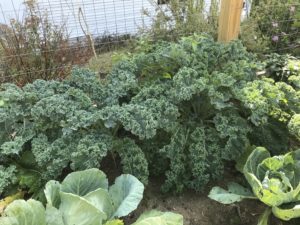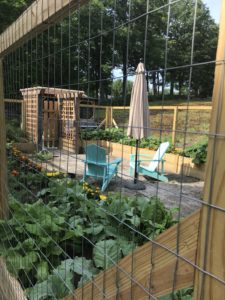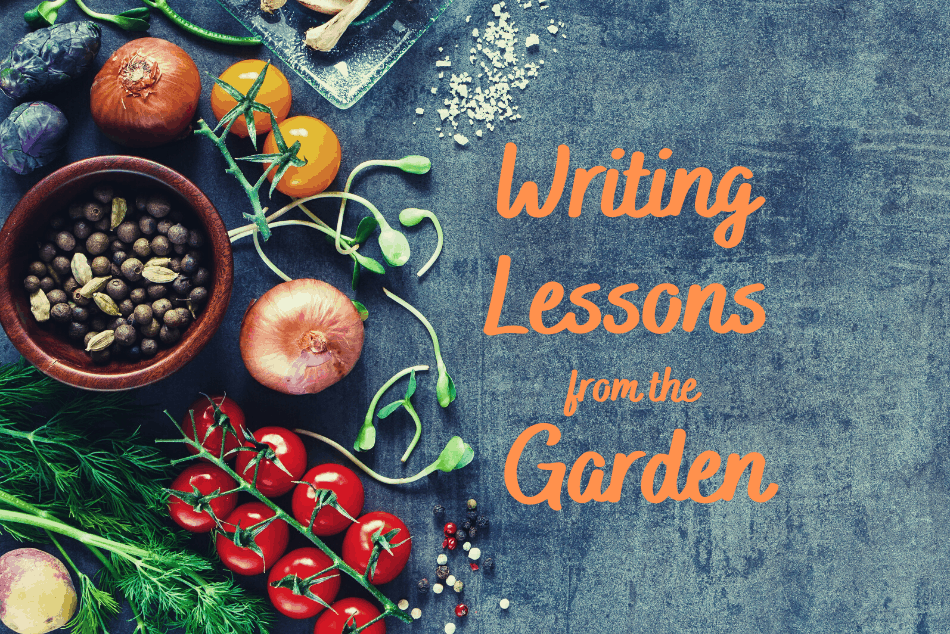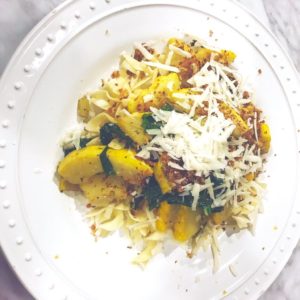During this wild and crazy pandemic year I planted my first potager garden. Something I’d always planned to do but finally managed to pull off. Like writing my first novel.
I learned a lot, and a lot of what I learned applied to writing as well as gardening. You amend the soil, sow the seeds, plant the seedlings, water, feed, harvest, prepare for winter. Like the writing process: You brainstorm, plan, write, rewrite, copy edit, promote, prepare for the next book. But some of the things I learned surprised me, just as both gardening and writing often surprise me.
When the lettuce bolts, pull it out.
I’d never grown lettuce before, so I didn’t even know it was bolting until my son told me. “You need to pull it out,” he said. I thought it was pretty, so I resisted. But eventually I ripped it out. Just like this sub-plot I had in THE HIDING PLACE (coming in March 2021) that revolved around an arcane clue. When you write a mystery, you need good clues—and I was inordinately fond of this particular clue. It was one of those brainstorms that came early on in the writing of the story, one of the inspirations for the story, and I was having a hard time letting it go. At the first draft, my editor asked me if I thought I really needed it. I said “Yes!” At the second round, he asked me again, and I said, “I’ll make it work.” By the third—and last—round, I just pulled the bolter out.
Why did I grow kale?
Everyone keeps telling me how great kale is. It’s healthy (a superfood!), it’s tasty, it’s easy to grow. It even looks beautiful in the garden. I should try it, I think. I grow it, and I cook it, and I try to eat it. But I still hate it.

(Yes, I know you can make kale chips. I hate those, too.) I should have listened to my gut and planted more okra where I grew kale. (I love okra.)
The same thing with writing. Just because everyone else is writing cozies or using Scrivener or joining every book club in the known universe doesn’t mean I should. And I won’t.
It takes a lot of tomatoes to make a quart of tomato sauce.
Wow. What a lot of work. I had no idea. But I had so many tomatoes, because I had so many tomato plants. (I didn’t trust the ones I grew from seed to produce, so I supplemented with plants from the nursery. I was wrong. They all produced.) So I thought, I’ll make tomato sauce. An exhausting and messy process: Pick the tomatoes, wash the tomatoes, boil the tomatoes, peel the tomatoes, remove the cores and the seeds of the tomatoes, cook and cook and cook the tomatoes. The good news: I think the sauce is really good. But next time I’ll remember and give myself more time. Like writing a book: Plot 100,000 words, write 100,000 words, edit 100,000 words, again and again and again. It’s an exhausting and messy process that takes longer and requires more effort than I thought it would. The good news: I think (she says hopefully) the book is really good. But next time I’ll remember and give myself more time.
Water every day whether you want to or not.
You have to show up and water your garden every day, just like you have to show up to write every day. If you don’t, you lose ground. Sometimes you lose the whole garden. I remind myself of this whenever I skip a day of watering and writing and have to work twice as hard and twice as long to perk up my plants and my plot.
Pray for rain.
Of course, if it rains, you can skip the watering. Which means you’ve got more time to write. I love writing on rainy days, knowing my garden is getting the showering it needs and I can focus on my story. (The same goes for snow. Bad weather makes for good writing.)
Swiss chard is good. Who knew?
My daughter lives in Switzerland and eats a lot of vegetables I’d never heard of until I visited her there. Swiss chard foremost among them. I avoided eating it there, but when I found myself sowing chard seeds (see below), she insisted I would love it. She was right. My editor insisted I would love his idea for a new scene that I’d initially pooh-poohed, and he was right. I wrote it and it was great. Just like sautéed chard and summer squash with pasta topped with asiago and roasted panko breadcrumbs.
There are more than 100 types of squash.
When we decided to put in the potager garden, my husband built me a beautiful space with raised beds and arbors and filled the beds with good soil amended with manure from our local landscape supply company. Which meant I had to grow a garden worthy of his efforts. I didn’t know anything about growing a garden, so I spent around fifty bucks for two 50-vegetable seed packets from Le Jardin du Gourmet in Vermont. (Best fifty bucks I ever spent. I’m just saying.) This included a lot of squash seeds, and since I’d heard squash was easy to grow, I planted some of every kind.

By summer’s end I was drowning in squash, none of which looked even remotely familiar to me, pumpkin aside. The moral of this veggie tale: Just because you can grow a zillion kinds of squash, doesn’t mean you should plant it all in your garden. It’s like research. Just because you can put in a zillion facts about insert-arcane-topic-of-your-choice-here in your story, doesn’t mean you should. (I know, I know, lose that arcane clue.)
Next time I’ll keep it simple.
That’s what I tell myself, even as I find myself daydreaming about Summer 2021, and the vegetables and fruits I’ll plant next year. No kohlrabi or kale. More okra and asparagus. And maybe climbing roses and an espaliered pear tree and heated cold frames…. Just like my next book, which I swear will be simpler in structure than the last book, even as I find myself daydreaming about an unreliable narrator and half a dozen different points of view and a story within a story….
What has your hobby taught you about writing? Join us on Facebook, and we’ll swap stories….






